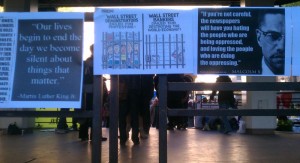The lesser depression has called forth a profusion of new and old theories about what's wrong with the American economy, and what can be done to put it right. As you can see in Mike Konczal's topological maps, these accounts can be broadly separated into "demand" and "supply" side arguments. Within the supply side, there is a subdivision between arguments based on government-induced uncertainty (due to taxation, regulation, policy, or deficits) and those centered around labor productivity. Of these I regard the uncertainty argument as opportunistic rhetorical hand-waving, with no real principled rationale; the argument about labor productivity, however, has some real substance behind it.
Curiously, however, the labor-productivity side contains proponents of two antithetical views: one group argues that jobs and income have stagnated because labor productivity is growing too slowly, while others argue that technology has been changing too fast for the labor market to keep up. Tyler Cowen's The Great Stagnation, which I've discussed before, is an argument for the first proposition. A new book provides an argument for the second: Race Against The Machine: How the Digital Revolution is Accelerating Innovation, Driving Productivity, and Irreversibly Transforming Employment and the Economy. The e-book, by Erik Brynjolfsson and Andrew McAfee of MIT, is a cheap and quick read (I call it a book, but it's really more like a very long article); it doesn't provide much detail that will be new to people who follow the topic, but it's a decent introduction to the effect of technology on the demand for labor. It's accessibly written without being too dumbed down, although it engages in some of the Gladwellese that seems to pervade recent pop-social science, such as the use of cutesy overriding metaphors (grains of rice on a chessboard, in this case). But while its account of the current economic landscape is useful, its ideas about where we should go from here are exceedingly lame.
Some liberals will probably react unfavorably to the book's whole thesis, because its emphasis on long-term technology and productivity issues threatens to distract attention from the more immediate problem, which is the tremendous shortfall in aggregate demand. The authors themselves are careful to say that they recognize the current demand problem, and that they do not believe that dealing with technological change should be a substitute for short-term measures to increase demand. Nevertheless, some commentators will no doubt be tempted to misuse the argument this way, as President Obama allegedly did when he used productivity-related claims to dismiss the need for additional stimulus.
But people on the left shouldn't let such foolishness scare them away from understanding changes in technology and labor productivity. Not only are such changes real and socially significant, but they present us with an opportunity to reorient the economic conversation in a more radical direction. To do so, however, we'll need to assimilate Brynjolfsson and McAfee's empirical argument, while rejecting their timid and depoliticized policy recommendations.
Technology and Employment
Race Against the Machine is organized around explaining the same empirical reality that confronts every would-be analyst of our economic woes: the stagnation of median incomes over the past three decades, long predating our current joblessness problem. As I noted recently, many of the underlying reasons for this stagnation are political, and this is something Brynjolfsson and McAfee don't discuss at all. But the fact that rising inequality and stagnating labor income have a political context doesn't mean they aren't also a function of technological changes: what we have seen in recent decades is a continuation of the disruptive and labor-displacing technical innovation that has always characterized capitalism, but without many of the countervailing protections that labor enjoyed in the heyday of the postwar Keynesian compromise. Brynjolfsson and McAfee do a good job of explaining the way labor markets play out under such conditions.
In contrast to Cowen, they argue that recent productivity growth has been quite good, and that published statistics are likely to under-state the increase in our social wealth. We're able to provide more goods and services with less and less human labor, which ought to make us materially richer as a society. The basic argument is similar to the one made by Farhad Manjoo in his recent series of articles on automation: computers and robots are rapidly permeating every part of the economy, displacing labor from high- and low-skill functions alike. Race Against the Machine gives many examples, from Google's self-driving cars to automation in Chinese electronics factories to software that can review legal documents. The problem, then, is not stagnation but uneven distribution: GDP per capita has continued to rise rapidly, but median incomes have stagnated, because the gains from growth are now going almost entirely to the very richest.
Three interrelated mechanisms are adduced to explain this lopsided growth: the advantaging of high-skill over low-skill labor, the rise of winner-take-all "superstar" markets, and the increasing returns to capital rather than labor. All three of these trends are facilitated and intensified by rapid technological advances--especially in computers and networks--that are making the skills of many workers obsolete while enriching the owners of capital and a few well-placed workers. Overall, this account of the relationship between technology and employment is the book's strength, particularly since it manages to avoid two common fallacies that beset such discussions, what I'll call the "end of work" fallacy and the "end of technology" fallacy.
The end of work fallacy, named for the title of a Jeremy Rifkin book, is the mistaken notion that if most of the labor currently performed by humans is replaced by machines, the result will inevitably be permanent mass unemployment at some point in the future. This is a fallacy for two reasons: first, because it ignores the possibility that we could all work less rather than leaving some unemployed, and second, because it assumes that human societies are somehow inherently limited in their ability to concoct new occupations for people to perform. While they ignore the first possibility, Brynjolfsson and McAfee do correctly point out that there is no reason to believe the second; just as we found new jobs for all the people displaced from working in agriculture a century ago, capitalism is no doubt capable of generating novel occupations for those whose jobs are automated in the 21st century (if all else fails, perhaps we can all become the personal servants of the top 1 percent). They frame this as an optimistic vision of our economic future, but I would interpret it somewhat differently: the gradual disappearance of work may not be inevitable, but it is also not something to fear: rather, it poses a major political and cultural choice for human societies centered around the institution of wage labor; I return to this point below.
Arrayed against the end of work fallacy, one often finds the end of technology fallacy, which insists that there is some obvious limit to just what can be automated. I guess this isn't so much a fallacy as a failure of imagination: as Brynjolfsson and McAfee point out, such pronouncements can look silly within a remarkably short time. As one example, they cite a 2004 book that confidently asserts the impossibility of something like the self-driving Google car. Today, the jobs most resistant to automation seem to be those that require finer-grained types of manual skill, as robots remain crude and awkward when they attempt to manipulate the physical environment. But while it is certainly possible that some kinds of automation will never be attained, it's dangerous to base one's economic analysis or one's politics on that belief.
While I find Race Against the Machine's argument about automation generally persuasive, the general theory of socio-technical development that the authors rely on is somewhat questionable. Citing Moore's law and the futurist Ray Kurzweil, Brynjolfsson and McAfee portray technological development as a process that starts off slowly but then relentlessly accelerates "into the phase where exponential growth yields jaw-dropping results". But this is a misleading picture of the history of technology. As Charles Stross has extensively argued, (and as I've written about previously), the path of progress within particular technological domains looks less like exponential growth than like a sigmoid curve, in which a middle period of rapid and seemingly exponential growth transitions into a mature plateau of slow progress. It's tempting, when you're in the rapid-acceleration phase of the curve, to extrapolate it forward exponentially--but this can lead to extremely misleading predictions. Mid-twentieth century futurists extrapolated the rapid improvements in transportation that they had lived through, and ended up imagining a future with flying cars but not the Internet; anyone who tries to imagine our future without accounting for unexpected and disruptive innovations is likely to be proven wrong as well.
The book's central claim nevertheless holds up without the dubious assumption of exponential growth. As the authors point out, we are in many ways in the early stages of adopting and integrating the technologies we already have into the economy, and so we can expect much more technological displacement of labor even if Moore's law slows down. And even if computer processing speed plateaus, some other area, such as biotechnology, will eventually enter the rapid-growth segment of its own sigmoid curve. Hence I generally accept the argument that rapid automation and technological unemployment will be a reality for the foreseeable future, and our societies need to find a way to deal with it.
The Future of Work
But it's in the recommendations for adapting to technological change that this book really falls short. The program for winning the future, it turns out, consists of encouraging entrepreneurship and improving education. The former, the authors say, will allow us to discover a bounty of new ways of employing people, through the magic of Hayekian tacit knowledge and Schumpeterian creative destruction. And an improved education system will ensure that the general population has the necessary human capital to participate in this magical new economy. This is a remarkably thin vision, redolent of the kind of popular techno-libertarianism that flourished at the height of the dot-com bubble, and it's no more compelling now than it was then. Brynjolfsson and McAfee write that "the stagnation of median wages and polarization of job growth is an opportunity for creative entrepreneurs", who can "combine the swelling numbers of mid-skilled workers with ever-cheaper technology to create value". Aside from the moral gruesomeness of this entrepreneurial paradise built on immiserated and precarious labor, where is the demand supposed to come from to realize all this "value"? This sounds like a recipe for re-creating the bubble economy of the last few decades, where most economic rewards go to capital and the working class props up its buying power with debt.
Brynjolfsson and McAfee do offer a more specific 19-point policy agenda. Some of the proposals are good ideas: reducing government support of the financial industry, decoupling social benefits from employment, scaling back copyright protections, increasing government funding for infrastructure and basic research, eliminating the home mortgage interest tax deduction, increasing high-skill immigration. But much of the rest is the usual grab-bag of neoliberal market idolatry: cut back workplace regulation, reduce taxes, make it easier to fire workers. The section on education, in particular, is just a rehash of the usual education reform arguments: less job security for teachers, longer hours, and more testing (though to be fair, they do at least call for higher teacher pay).
In the end, Brynjolfsson and McAfee don't even try that hard to make the case that their agenda will actually employ everyone or reverse rising inequality and stagnant incomes--they admit that "not everyone can or should be an entrepreneur, and not everyone can or should spend 16 or more years in school". But they casually dismiss the one thing that indisputably would address the unequal rewards of the contemporary economy: direct redistribution of income. "While redistribution ameliorates the material costs of inequality", they say in their one mention of the possibility, "it doesn't address the root of the problems our economy is facing" and "does nothing to make unemployed workers productive again". There's an implicit belief here that distributional outcomes somehow aren't "real" unless they are the result of the private labor market operating in the absence of government transfers. This denigrates the robustness of redistribution as a program: European social democracy, for all its shortcomings, has shown that it's possible to create an enduring system in which highly unequal market outcomes are ameliorated by government taxes, transfers, and social programs. That's one reason I'm partly sympathetic to the model of "globalize-grow-give" progressivism, which focuses on remediating inequality through redistribution rather than tight regulation of the labor market: leaving the labor market as it is and then doing lots of redistribution on the back end may not be ideal, but it would be a lot better than what we have now.
But if technology really is dramatically reducing the need for human labor, then we have an opportunity to think bigger and better, getting beyond merely trying to scrape up new skills and new jobs for the displaced proletariat. If you're a regular reader, you know where I'm going with this by now; as somebody said of one of my earlier renditions on this theme, "we get it--Peter Frase hates work". Totally missing from Race Against the Machine is any consideration that we might take some of our productivity gains in the form of free time rather than income. Nowhere do the authors even contemplate reducing the length of the work week and work year, or accepting a lower labor-force participation rate. Thus, despite constantly reminding us of all the ways in which technology has improved our standard of living and transformed society, Brynjolfsson and McAfee never question the centrality of wage labor in its current form: they never consider that there is any alternative to a society in which everyone expects, and is expected, to spend the bulk of their life as a 40 (or more) hour per week wage laborer, or as a profit-maximizing "entrepreneur".
Mostly, the immortality of capitalism is just an implicit assumption. But to the extent that this book contains a defense of the wage labor society, it is this: "the value of gainful work is far more than the money earned", and "forced idleness is not the same as voluntary leisure". Both are true, and both are reasons why in the short term, a federal jobs program is a good demand--and one that's more likely to revive the economy than any amount of education reform or entrepreneurialism. But the question that Race Against the Machine raises is explicitly not about the short term aggregate demand problem, to which some package of monetary and fiscal stimulus could be an adequate solution. If we ever escape from the nightmare of self-inflicted disinflationary contraction, we will essentially be back where we started before the financial crisis--and we will still have to come to terms with the constantly changing balance of labor between human and machine, and what it means for the future of work.
We live in a society in which a huge amount of a person's status and sense of self-worth is tied up in what they do for money. And the stigma of joblessness, combined with the stresses of job-hunting and dealing with the meager American welfare state, make unemployment a physically, psychologically, and emotionally damaging ordeal. But these aren't inherent features of the human condition; as another analyst of productivity-enhancing technology said:
Just as the savage must wrestle with Nature to satisfy his wants, to maintain and reproduce life, so must civilised man, and he must do so in all social formations and under all possible modes of production. With his development this realm of physical necessity expands as a result of his wants; but, at the same time, the forces of production which satisfy these wants also increase. Freedom in this field can only consist in socialised man, the associated producers, rationally regulating their interchange with Nature, bringing it under their common control, instead of being ruled by it as by the blind forces of Nature; and achieving this with the least expenditure of energy and under conditions most favourable to, and worthy of, their human nature. But it nonetheless still remains a realm of necessity. Beyond it begins that development of human energy which is an end in itself, the true realm of freedom, which, however, can blossom forth only with this realm of necessity as its basis. The shortening of the working-day is its basic prerequisite.
"We clearly are not pessimists about technology and its impacts", write Brynjolfsson and McAfee. They add that they considered calling their book "The Digital Frontier, since the image that keeps occurring to us is one of a huge amount of new territory opening up because of technological improvement and innovation". As it happens, I'm not a pessimist either, and I think the Digital Frontier is a wilder place than our intrepid economists imagine. Out there you'll find the advocates of work time reduction and guaranteed income and plenitude, and many others working to build the realm of freedom and abundance rather than keep capitalism's engine of artificial necessity and scarcity chugging along. The defenders of the current order will keep trying to convince us that in a technologically advanced world of material plenty, more capitalism is still the solution to all our problems; but perhaps it is capitalism itself that is holding us back, and maybe it's time for that integument to burst asunder.















